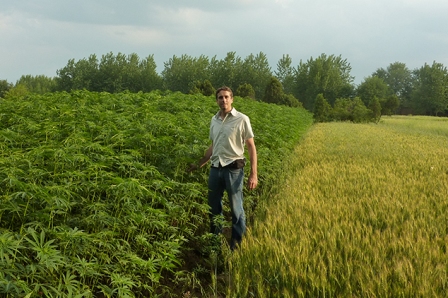For Hemporium’s Tony Budden, having his dream realised of cultivating industrial hemp as a sustainable crop in South Africa is a three-step process.
CHANGE AGENT: Why on Earth is the potential of the hemp industry not being supported?
TB: Logically, I have no idea. Archaeologists have discovered hemp clothing dating back to 500 BC, still intact. Where do you think the Afrikaans word for a shirt comes from … hemp? Henry Ford even wanted his model-T car to run on hemp seed oil. The American Declaration of Independence was printed with hemp fibre. Yet, the history of the United States of America has had a profound effect on the way the rest of the world has treated this valuable crop.
In the 1930s, USA introduced laws to destroy all hemp plants as a result of political pressure from the cotton industry, the DuPont Corporation and William Randolph Hearst, the newspaper magnate. Knowing that the significance and advantage of hemp would cause them to lose millions of dollars, they began a political campaign of mass hysteria to demonise the plant. In 1937, all hemp was criminalised in the US.
And so began a domino effect of western countries following America’s suit. This unfounded ‘fear’ of marijuana’s non-psychoactive cousin is something I call, “cannaphobia”.
CA: How do you get around and above this “cannaphobia” stigma?
TB: The Hemporium’s slogan is ‘Innovate. Educate. Cultivate.’ And that’s what we want to do. Our ultimate goal is to grow and cultivate hemp, but first we need to prove its worth in the market – by offering a range of diversified products – and to inform consumers and the government of its value – by elucidating the facts and demonstrating its natural benefits. Last year, we even built South Africa’s first hemp house in Cape Town.
Without consumer demand and government interest, the industry will go nowhere. We make our products locally – the minute you can touch and feel something, you have a better sense of it. The ‘Hemp Now’ petition is also gathering a lot of traction. We’ve seen the potential for petition – just look at Avaaz and how that mobilises global communities. Government lobbying is also very important; we need to find champion to support the hemp industry.
CA: Is our socio-historic context to blame for the bio-racism against hemp?
TB: South Africa and Egypt were actually the first economies to ban cannabis. It came from a time of racial laws – even before America’s trickery. Indian farm workers used to bring the cannabis seed to South Africa to grow the plant here and smoke it whilst working on the farms.
That just goes to show that a lot of our laws are based on socio-historic contexts that don’t apply anymore. We need to relook at what we’ve got and usher in our scientific knowledge and standards, making sure that the current laws are based on current knowledge and science, not ghosts of the past.
Hemporium will be playing a part in a ‘Commercial Incubation Trial’ and planting 2 hectares of industrial hemp in the Western Cape in 2012, leading to a fully-fledged hemp industry in the coming years.
This article is from the Change Agent publication. For more information on SoA or to view more articles from the Change Agent, please visit






